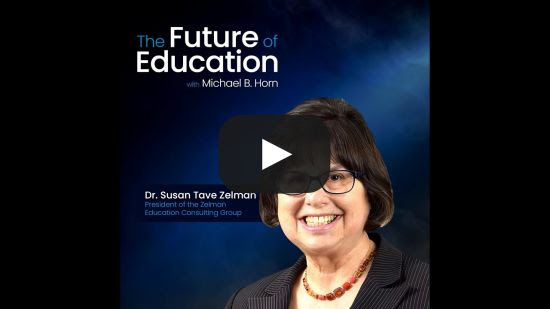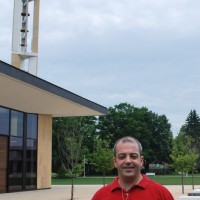February 3, 2023
The Buying and Selling of American Education
The first of two items from a neo-liberal… This one is an item from a business professor with little direct experience in education, but who believes free market economic principles are the answer to education’s (and pretty much all other society’s social) problems.
Open in app or online
FEB 1 The Buying and Selling of American Education
This episode is for paid subscribers
MICHAEL B. HORN Having served in a number of roles in education—from the superintendent of public instruction of Ohio to a teacher—Susan Zelman has seen many sides of the American education system. In this conversation, she shares some of the big lessons from her just released book, The Buying and Selling of American Education—and her conclusions about how to move forward to support the success of every single child. As always, you can listen to the podcast, watch this on YouTube, or read the transcript.
Michael Horn: Susan has served in a number of interesting roles across the education ecosystem. She’s currently president of the Zelman Education Consulting Group. I’ll tell you more about why I’m particularly interested in having her today in a moment. But just to give you a little bit more of her background, before that, she was the executive director of the superintendency at the Ohio Department of Education. She has also served as the senior vice president for education and children’s programming at the Corporation for Public Broadcasting, where she developed policies and programs to integrate public service media into a national reform education agenda. And prior to that, she was the superintendent for public instruction in Ohio for 10 years. And during her tenure, the state of Ohio went from 29th among states to fifth in the 2009 Education Week quality counts report. But more important for this conversation, she’s also the author, or co-author I should say, of a new and very interesting book titled The Buying and Selling of American Education. Susan, welcome. It’s great to see you.
Susan Zelman: Oh, thanks. It’s great to be here, and thank you for interviewing me.
Horn: Oh, you bet. You bet. So before we get into the conversation around the book and so forth, I’ve given obviously the thumbnail, if you will, of your bio, but I’m just sort of curious about your own journey through education and education policy and how that journey perhaps has shaped where you’ve spent your time and your passion within the world of education.
Zelman: Well, I love that question. And actually my, I think education journey started when I was in sixth grade in Mrs. Eisner’s class. At that time, we were living in the Marble Hill projects. And on my floor, a family moved in from Harlem. And the boy who was going to PS 122, though it’s now not called PS 122, of course it was reconstituted, but was in my class, in my sixth grade class. And I actually tried to befriend him and walked to… We had a long walk to the elementary school together. And he seemed like such a nice, bright guy, and he was quite tall. And he lasted in my sixth grade class for one week, and then he got demoted to the fifth grade. So, I asked my teacher, Mrs. Eisner, “Why?” She said, “Well, he went to school in Harlem and they don’t have good schools there.”
And I thought, how unfair. And not only that, but he also got then demoted to the fourth grade. And that really freaked me out because he was so tall and just stood out a sore thumb. And I thought, God, the system has failed poor Ernest Gibbs. And to this day in my old age, I still remember Ernest Gibbs and kind of wonder whatever happened to him. The second thing is that my grandparents were immigrants from Russia, but education was the route to the middle class. I mean, my father was a lawyer, my uncle was a lawyer and a judge, and my uncles went to the city college in the thirties, and it was their way to become middle class. So, education was always very important and a value. Plus, I was kind of a nerdy kid, and I was the type of kid who failed summer camp.
Nobody wanted me on their volleyball team, but I couldn’t wait for school to start. So in some sense, even though I know my father wanted me to be a lawyer, education was my passion, and I felt comfortable at school. And then I could have done college in three years, but I stayed on to get certified. And for one year, I was a high school social studies teacher at Grace Dodge Vocational High School… And I so… I would have to leave the teacher’s room because I thought they were so judgmental about their students. They said they couldn’t tell the Bronx students from the students at Grace Dodge, and that really me off. So, then I was able to get a full scholarship, a fellowship then to go to that, but I have to say this in… Because I live in Ohio right now, that other university up north, University of Michigan.
And I was in a doctoral program funded by the US Department of Education to train people who were interested in education, who had an education background, but who would do research planning and evaluation for public schools. And I got to do my dissertation from the Harvard Civil Rights Civil Liberties Law Review. I met my husband that brought me to Boston. And then he put it in our marriage contract, our marriage was no void unless I finished within a year, which I did. And then ironically, through a high school English teacher he had, I got a job teaching at Emmanuel College. And I was an academic for the first 14 years of my career. I also simultaneously held a research appointment at the Harvard Educational Technology Center. Then I got an NSF grant from Columbia Teachers College for women who taught in small liberal arts colleges.
I was getting kind of bored. Even though my kids were young. And I happened to meet actually Mike Dukakis at our neighbors party who was in his law firm and becoming a judge, and I was recruited to join the caucus administration as an associate commissioner. So, I left my brilliant academic career and joined state government. And not only that, but I really found my passion. I felt that I could help design and improve educational systems and I could make a sort of a greater impact. And I was the associate commissioner for a new division called Educational Personnel, and I lasted there for about six and a half years. And then I had an opportunity to really break the glass ceiling and become the first deputy commissioner in the state of Missouri. Oh my gosh, a far cry if we’ve ever been. And my two girls were in college at the time, but we took our son to Missouri, and he used to call it the good enough state.
First of all, he was angry because I denied his birthright of going to Harvard Square every day when he was in high school, but the reality was I realized the variability in the quality of education from state to state. He went to Arlington High. But quite frankly, where he went, which was considered a very good district in Missouri, was not as challenging for him. And that gave me even more passion. And then I was recruited to be a state superintendent in Ohio, and I did that for 10 years. I went to Washington for almost two, came back. I actually also did a short stint in a publishing company, Houghton Mifflin Harcourt. Yeah, Houghton Mifflin. And then a new governor came in, he wiped me, and I came back as executive director.
Horn: I’m just curious because you have a lot of experience across a lot of states, a lot of context, a lot of personal passion, and anger in some cases, tied into all of this, right? And you’re sort of your why. And I’m curious what you wanted to pull into this book and really share with the readers as you wrote it.
Listen to The Future of Education episodes in the app
No comments yet.
RSS feed for comments on this post. TrackBack URI
- SEO Powered Content & PR Distribution. Get Amplified Today.
- Platoblockchain. Web3 Metaverse Intelligence. Knowledge Amplified. Access Here.
- Source: https://virtualschooling.wordpress.com/2023/02/03/the-buying-and-selling-of-american-education/
- 10
- 9
- a
- Able
- About
- academic
- across
- actually
- administration
- agenda
- All
- always
- American
- among
- and
- android
- android app
- anger
- answer
- app
- appointment
- around
- Arts
- Associate
- author
- auto
- back
- background
- because
- become
- becoming
- before
- believes
- BEST
- Bet
- Big
- Bit
- book
- Bored
- boston
- Break
- Bright
- brilliant
- Broadcasting
- brought
- business
- Buying
- CA
- call
- called
- Camp
- Career
- cases
- Category
- ceiling
- Center
- Certified
- challenging
- child
- City
- civil liberties
- Civil Rights
- class
- clear
- Co-Author
- College
- Colleges
- Columbia
- comfortable
- comment
- comments
- commissioner
- company
- considered
- consulting
- context
- contract
- Conversation
- CORPORATION
- could
- course
- curious
- Currently
- data
- day
- Department
- deputy
- Design
- developed
- DID
- direct
- Director
- district
- Division
- Dodge
- Dont
- during
- Economic
- ecosystem
- Education
- Education Week
- educational
- English
- enough
- Episodes
- Ether (ETH)
- evaluation
- Even
- EVER
- Every
- every day
- executive
- Executive Director
- experience
- Failed
- family
- Far Cry
- feedback
- Firm
- First
- Floor
- Forward
- found
- Fourth
- Francisco
- Free
- from
- full
- funded
- future
- get
- getting
- girls
- Give
- given
- glass
- Go
- God
- going
- good
- Government
- Governor
- grade
- grant
- great
- greater
- Group
- Guy
- Half
- happened
- harvard
- having
- Held
- help
- here
- High
- How
- How To
- HTTPS
- I’LL
- identifier
- Immigrants
- Impact
- important
- improve
- in
- integrate
- interested
- interesting
- iOS
- iOS app
- Ironically
- IT
- items
- Job
- join
- joined
- journey
- judge
- Kid
- kids
- Kind
- Know
- Law
- law firm
- lawyer
- Leave
- Lessons
- Listening
- little
- live
- living
- Long
- Lot
- love
- make
- many
- Market
- Media
- Meet
- Meta
- Michael
- Michigan
- Middle
- moment
- more
- move
- National
- neighbors
- New
- North
- NSF
- number
- Ohio
- Old
- ONE
- Opportunity
- Other
- own
- paid
- particularly
- party
- passion
- People
- perhaps
- personal
- Personnel
- planning
- plato
- Plato Data Intelligence
- PlatoData
- plus
- podcast
- policies
- policy
- poor
- Post
- presentation
- president
- pretty
- principles
- Prior
- problems
- Professor
- Program
- Programming
- Programs
- projects
- public
- Publishing
- put
- quality
- question
- Read
- readers
- Reality
- realized
- reduce
- reform
- released
- remember
- report
- research
- resource
- review
- rights
- roles
- Room
- Route
- Russia
- Said
- San
- San Francisco
- School
- Schools
- Second
- seemed
- Selling
- senior
- sense
- service
- shaped
- Share
- Shares
- Short
- should
- Sides
- Simple
- simultaneously
- single
- site
- SIX
- sixth
- small
- So
- Social
- some
- son
- spam
- spent
- square
- start
- started
- State
- States
- stayed
- Still
- street
- Students
- studies
- success
- such
- summer
- support
- Susan
- syndication
- system
- Systems
- TAG
- teacher
- teachers
- Teaching
- team
- Technology
- The
- The Future
- The State
- the world
- their
- thing
- thought
- three
- Through
- thumbnail
- Tied
- time
- titled
- to
- today
- together
- Train
- Transcript
- under
- university
- University of Michigan
- us
- value
- Vice President
- wait
- walked
- wanted
- washington
- Watch
- week
- welcome
- What
- which
- WHO
- will
- within
- Women
- WordPress
- world
- would
- year
- years
- young
- Your
- youtube
- zephyrnet













